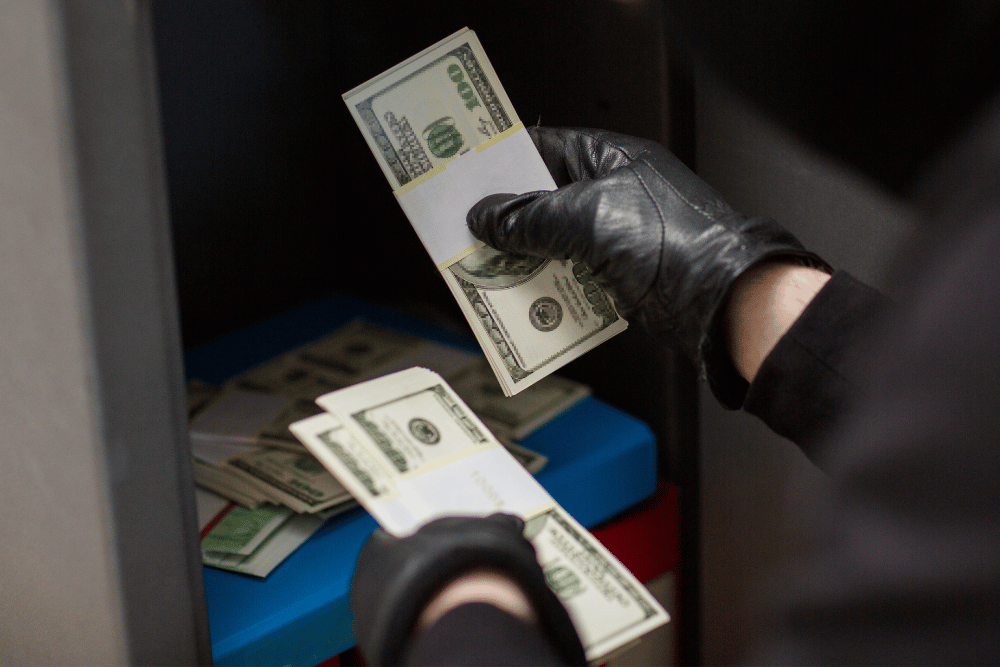What Is Grand Theft?

Have you ever wondered why some thieves get a slap on the wrist while others end up wearing an orange jumpsuit behind bars? While a variety of factors come into play, one of the most important is the difference between petty theft and grand theft.
What is the distinction? No, the answer isn’t the word “grand.” And no, gamers, the term isn’t unique to “Grand Theft Auto” or its many sequels, although the gist of this famously controversial video game series has you on the right track.
Let’s take a closer look at the ramifications of sticky fingers and big-time heists.
The Difference: Petty Theft vs. Grand Theft
At its core, theft involves unlawfully taking someone else’s property, intending to deprive them of it permanently. For example, if someone breaks into a house and steals a television, that’s theft. If a person shoplifts a pair of sunglasses from a store, that’s also theft.
Petty and grand theft are both types of theft. However, the difference between grand theft vs. petty theft is one of scope. The severity of the offense hinges on a few key factors, including the value of the stolen items and the manner in which the theft is perpetrated.
Petty theft involves minor infractions, such as shoplifting small items or stealing things that are objectively insignificant in value. These acts, while unlawful, are generally considered misdemeanors. They incur light penalties, such as fines or community service.
On the contrary, grand theft is a serious crime. It involves the theft of property or money exceeding a specified value threshold, warranting more severe legal consequences. Grand theft is often categorized as a felony, and the punishments reflect that. Convicted individuals may face substantial fines, probation, or imprisonment, depending on the circumstances surrounding the offense.
It’s worth noting that jurisdictions have different thresholds for grand theft. In some places, the monetary value of stolen property determines whether a crime was grand theft. In others, the type of property stolen or the circumstances surrounding the theft matters more.

Navigating the Degrees of Grand Theft
The law also breaks grand theft into degrees of seriousness based on what the thief stole and how much it was worth. Understanding these levels helps us understand how the law deals with different kinds of theft.
- First-Degree Grand Theft: At the apex of grand theft lies first-degree offenses, characterized by the theft of high-value items or substantial sums of money. These offenses often involve sophisticated schemes or blatant deception, resulting in significant financial losses for the victims. Examples include embezzling corporate funds, stealing luxury vehicles, or orchestrating elaborate fraud schemes.
- Second-Degree Grand Theft: Second-degree grand theft involves thefts of considerable value, albeit not as exorbitant as those in the highest category. Perpetrators may target expensive electronics, jewelry, or firearms, thereby inflicting notable financial harm on the victims.
- Third-Degree Grand Theft: Third-degree offenses involve thefts of moderate value. These still exceed the thresholds for petty theft but fall short of the criteria for first and second-degree offenses. Examples include stealing high-end clothing, valuable artwork, or substantial sums of cash.
Similar to theft, larceny involves stealing—specifically, stealing physical items. Crime reporting agencies often group larceny and theft together. According to FBI data, larceny-theft consistently accounts for the majority of property crime offenses reported nationwide.
Grand Theft In Real Life
To illustrate these legal definitions and show how they might affect you, let’s take a look at some real examples of grand theft.
Corporate Embezzlement Scandal (First-Degree)
One real example of grand theft involving corporate embezzlement is the case of Bernie Madoff. Madoff was a prominent financier and former chairman of the NASDAQ stock exchange who orchestrated one of the largest Ponzi schemes in history. Over several decades, Madoff defrauded thousands of investors out of billions of dollars through his investment firm, Bernard L. Madoff Investment Securities LLC.
Madoff’s scheme involved soliciting investments from clients under the guise of legitimate investment strategies, promising high returns. However, instead of investing the funds as promised, Madoff used new investors’ money to pay returns to earlier investors, creating the illusion of profitable returns. In reality, there were no actual investments. Madoff was simply using the funds to finance his lavish lifestyle and pay off existing investors.
When the scheme collapsed in December 2008 amid the global financial crisis, it came to light that Madoff had embezzled an estimated $65 billion from his clients. He was subsequently arrested and convicted of multiple counts of fraud, money laundering, and other related crimes. Madoff was sentenced to 150 years in prison. The fallout from his fraudulent activities had far-reaching consequences for his victims and the financial industry as a whole.
Jewelry Store Heist (Second-Degree)
In 2018, a group of thieves targeted a jewelry store in New York City’s Diamond District. The thieves used sophisticated tools to break into the store during the night. They stole a collection of rare and expensive diamonds, watches, and other jewelry items. The total value of the stolen merchandise was over $5 million.
Despite the substantial value of the stolen items, this case was categorized as second-degree grand theft because it did not meet the higher value threshold required for first-degree classification. The perpetrators were eventually apprehended and charged with multiple counts of grand theft, burglary, and related offenses. The incident highlighted the audacity and planning involved in high-value thefts, as well as the significant financial losses incurred by victims in such cases.
International Vehicle Theft Ring Bust (Third-Degree)
In 2019, a group orchestrated a series of thefts targeting luxury vehicles in a suburban neighborhood. The thieves used sophisticated techniques to bypass security systems and hotwire the vehicles, including high-end SUVs and sports cars. Over several months, they stole multiple vehicles valued at tens of thousands of dollars each.
While the stolen vehicles were of considerable value, the total monetary amount did not meet the criteria for first- or second-degree grand theft. Therefore, the perpetrators were charged with third-degree grand theft, along with additional charges related to vehicle burglary and criminal mischief.
This example highlights how third-degree grand theft can involve thefts of substantial value that exceed the thresholds for lesser offenses but do not reach the level of higher-degree grand theft.
How to Give Grand Theft a Grand Finale
Regardless of the type of theft, property owners are fed up. Business owners are seeing their bottom line disappearing, and homeowners are fearful for the safety of their lives and livelihoods. Many wish they could take matters into their own hands.
The first step for property owners is to install a reliable video surveillance system. Deep Sentinel offers wireless and PoE cameras with smart threat detection and live professional guards behind every camera, ready to step in as soon as thieves come stalking by.
But what about those pesky, persistent thieves? Businesses can achieve rapid and lasting results with Deep Sentinel’s newest innovation—FlashBang™.
FlashBang suppresses and subdues criminals with advanced physical security measures. It integrates with Deep Sentinel’s award-winning live monitoring service, allowing businesses to deploy additional deterrents, including:
- Smoke Bombs
- Pepper Spray
- Strobe Lights
- Ear-Piercing Sirens
Between a reliable camera system and upgraded protection with FlashBang, your property is in the most trustworthy of hands. Partner with DeepSentinel and put an end to theft—whether it’s petty or grand—for good. Call 833.983.6006 for your free security consultation today.
Need a Solution that Prevents Crime? Deep Sentinel is the only security technology that delivers the experience of a personal guard on every customer’s home and business. Call 833.983.6006 for your free security consultation.

